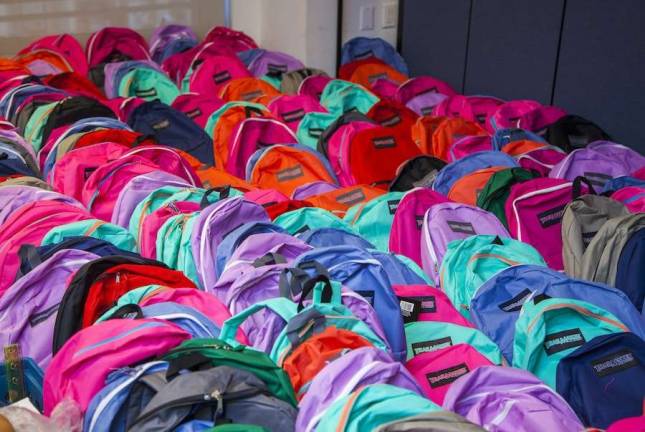back to school backpacks

To combat the lack of resources homeless children face when beginning the academic year, the Coalition for the Homeless is holding its 11th annual Project: Back to School.
Students in all grade levels will receive backpacks filled with school supplies, and the Coalition — an organization that partners with homeless shelters to provide food, job training and advocacy for homeless New Yorkers — is asking for a wide variety of donated items, from glue sticks to small dictionaries.
“If things don’t change, we’re looking this year at having every one in seven public school kids being homeless at one point in time,” said Sarah Murphy, the Coalition’s director of development.
According to the Coalition, over 111,500 students in the city were homeless at some point during the 2017-2018 academic year. This year, the Coalition is partnering with the Huntington Learning Center, Manhattan Mini Storage and the United Federation of Teachers to collect thousands of backpacks.
“The reasoning behind that is something that we saw that still happens is that kids will go into school, and it’s very sad, but they’ll have their pencils and maybe a notebook or something in something as simple as a shopping bag and be walking around [with] that instead of a backpack,” Murphy said. “So you can imagine what that does to a kid’s psyche when they’re already feeling the shame and trauma that comes with becoming homeless, and now to almost be called out for not having enough to be able to provide.”
To organize the drive, the Coalition coordinates drop-off locations for supplies and works with volunteers to sort items and fill backpacks. When they run short on supplies, the Coalition buys them to fill in the gaps and make sure every student has the same resources.
Murphy said that homeless children are more prone to fall behind in school. To apply for a shelter, homeless families must show up together, leading students to miss school. They can also be transferred to various shelters, and the uprooting can be chaotic.
“Sometimes they’re transferred to shelters up to two hours away from where their school is,” Murphy said. “So you have the ability to stay in your own school when you become homeless, even if it’s outside of that range, but that means that it’s on the kids and the parents to get them there on time.”
Murphy said that by being able to give children school supplies, the Coalition relieves the pressure on parents to provide while simultaneously giving kids more confidence going into their first day of school. The Coalition further supports parents in homeless shelters by providing a year-round program for children in the shelters called Bound for Success.
During the school year, children can get one-on-one tutoring and finish their homework through Bound for Success, as shelter rooms don’t often have a table or space for kids to sit and do their work.
“This gives them sort of a little oasis in the middle of their shelter where they can come after school,” Murphy said. “They can do it every day, they can get their homework done and then we do another recreational activity — whether it’s reading time, some sort of creative thing, some sort of creative outlet or sports or things like that — so they can have both the education component and then just have fun and be kids, because after a long school day they just need to decompress.”
The Coalition’s programming and backpack drive make an impact on the families and shelters they serve.
“I think any little thing you can do to try and give them that confidence makes such a difference,” Murphy said.